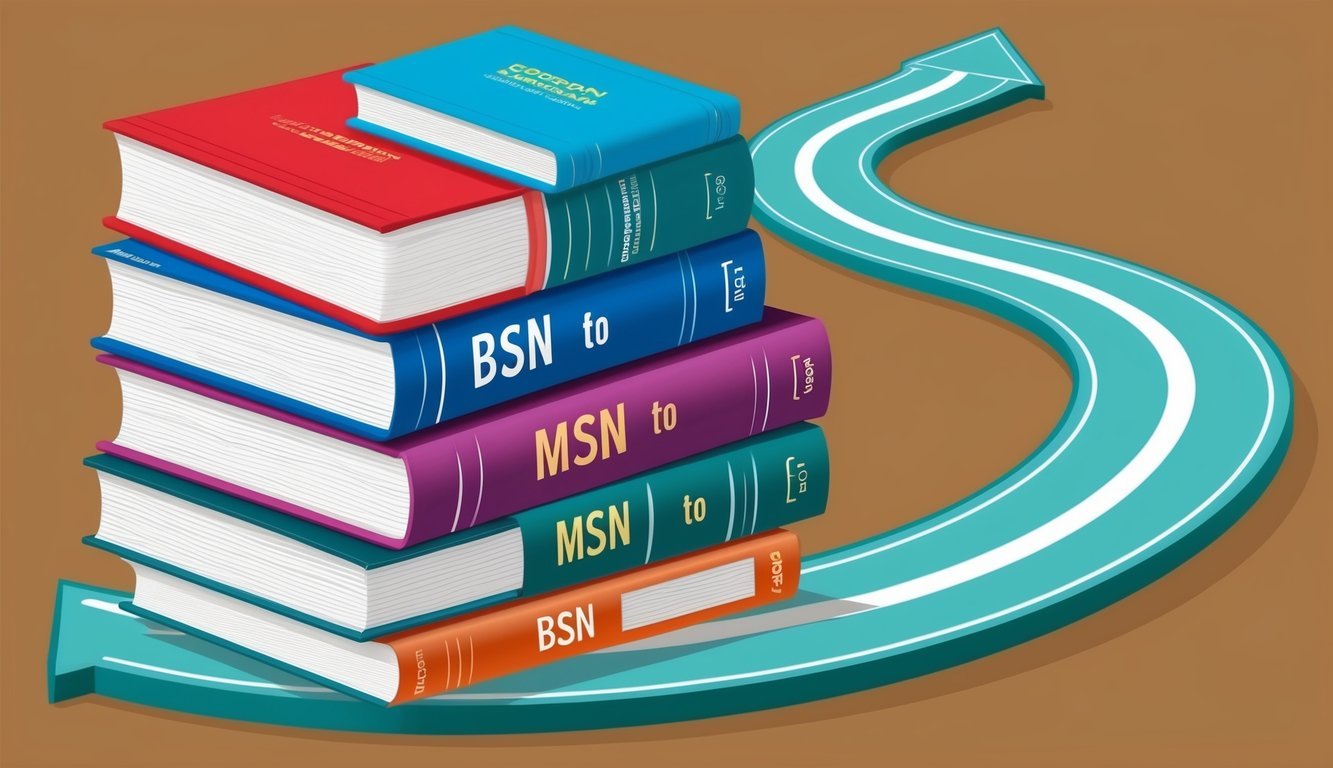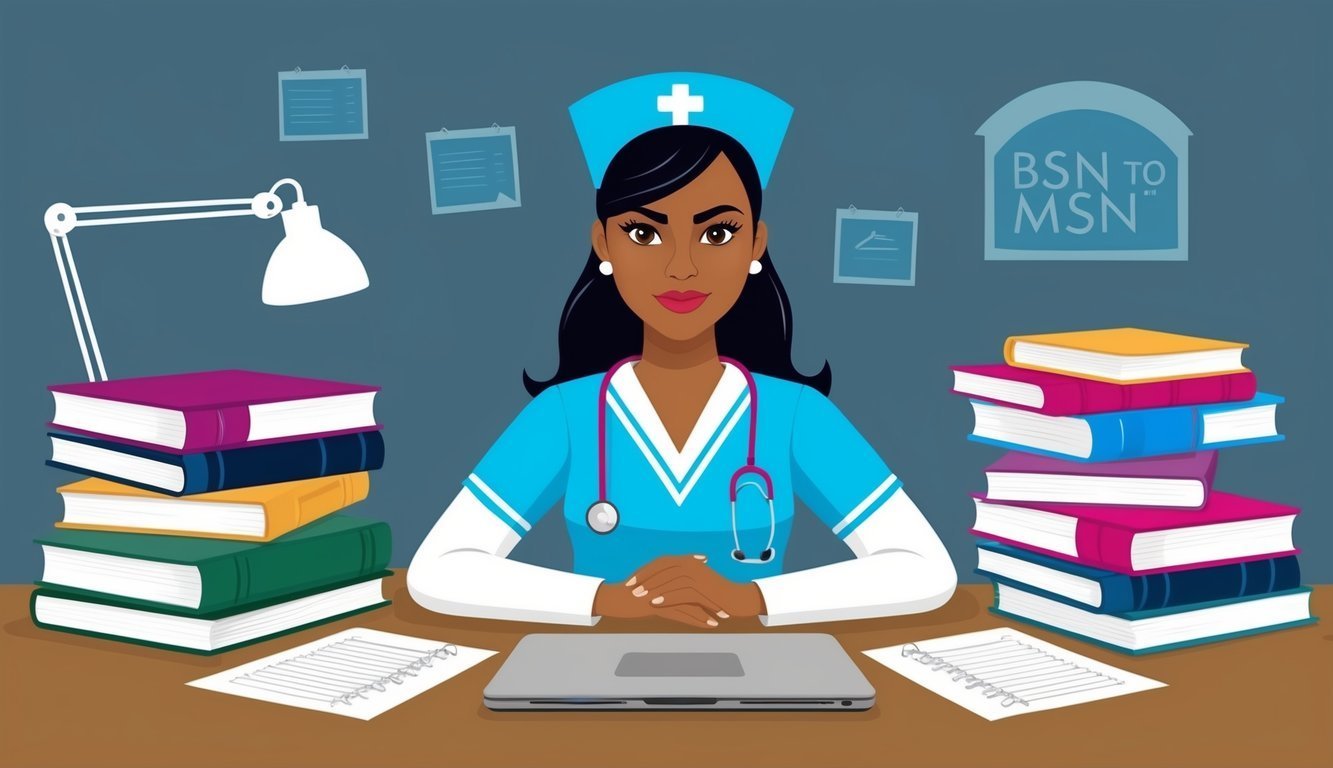Earning a Master of Science in Nursing (MSN) is a significant step for many professionals in the field.
If you already hold a Bachelor of Science in Nursing (BSN), you may be wondering how long it takes to transition from a BSN to an MSN degree.
Generally, full-time students can complete the program in about 15 to 24 months, while part-time options can extend this timeframe to 2 to 4 years.
Understanding the various elements of a BSN to MSN program can help you plan your educational journey better.
These programs often offer specializations that cater to different interests and career goals, providing you with opportunities for professional growth.
As you explore the options available, consider how these advancements can enhance your nursing practice and open doors to new roles within the healthcare system.
Key Takeaways
- The BSN to MSN program typically takes 15-24 months for full-time students.
- Specializations can help tailor your education to specific nursing interests.
- Advancing your education can lead to greater professional opportunities in nursing.
Understanding BSN to MSN Programs
BSN to MSN programs offer a pathway for registered nurses (RNs) to advance their education and careers.
These programs are designed to provide you with the skills and knowledge needed to excel in nursing practice.
They often include flexible online coursework, making it easier for you to balance work and studies.
Educational Pathways
To enter a Master of Science in Nursing (MSN) program, you first need a Bachelor of Science in Nursing (BSN).
The typical duration for completing a BSN is about 2.5 to 4 years.
After that, an RN can apply for an MSN program, which can usually be completed in 2 to 4 years.
You have options when choosing a pathway.
Some programs are straightforward, while others may offer accelerated formats.
For instance, online BSN to MSN programs can help you complete your degree faster, often within 15 months.
Accreditation and Quality
When selecting a BSN to MSN program, it’s crucial to check for accreditation.
Programs accredited by organizations like the Commission on Collegiate Nursing Education (CCNE) or the National League for Nursing (NLN) meet high educational standards.
Accreditation ensures that the program you choose will provide quality education and is recognized by employers.
It also makes you eligible for financial aid and licensure.
A CCNE-accredited program is often considered more reputable, enhancing your job prospects upon graduation.
Admission Requirements
Admission requirements for BSN to MSN programs can vary widely.
Generally, you will need a BSN from an accredited program.
Most schools also require clinical nursing experience of 1 to 2 years as an RN.
Additionally, you may need to provide proof of language proficiency and meet GPA standards.
Some programs may ask for letters of recommendation and personal statements.
Be sure to check the specific prerequisites for each program you are considering to ensure you meet all the requirements.
Specializations and Curriculum

In the journey from a Bachelor of Science in Nursing (BSN) to a Master of Science in Nursing (MSN), you will encounter various specialties and a well-structured curriculum.
Understanding these elements is essential for selecting a path that aligns with your career goals.
Nursing Specialties
Choosing a specialty is a critical step in your MSN journey.
Options include:
- Nursing Administration: Focus on leadership roles in healthcare settings.
- Nurse Educator: Prepare to teach future nurses in academic or clinical settings.
- Family Nurse Practitioner (FNP): Provide comprehensive care to families across their lifespan.
- Psychiatric-Mental Health Nurse Practitioner (PMHNP): Specialize in mental health, addressing psychological needs.
Other specialties include Adult-Gerontology Acute Care Nurse Practitioner, Clinical Nurse Specialist, Nursing Informatics, Clinical Nurse Leader, and Nurse Administrator.
Each specialty prepares you for specific roles and emphasizes essential skills such as evidence-based practice and interpersonal communication.
Curriculum Development
The curriculum for MSN programs is designed to enhance your nursing practice.
It typically includes both core courses and specialized courses tailored to your chosen path.
Key components often include:
- Evidence-Based Practices: Teaching you to evaluate and apply the latest research to patient care.
- Learning Styles: Addressing different methods of learning to enhance your educational experience.
- Contemporary Curriculum Design: Ensuring the curriculum stays relevant with evolving healthcare needs.
Courses may cover advanced topics such as health policy, ethics, and informatics.
The emphasis on skill development prepares you for clinical leadership and management roles upon graduation.
Professional Development and Opportunities

Pursuing a Master of Science in Nursing (MSN) can significantly enhance your professional development and open up various opportunities in the healthcare field.
This includes advanced roles focusing on leadership and clinical practice, which are essential in today’s healthcare settings.
Leadership in Healthcare
Advancing your education from a Bachelor of Science in Nursing (BSN) to an MSN prepares you for leadership roles in healthcare organizations.
As a nurse leader, you can influence policies, improve patient care, and drive change within your team and organization.
Key leadership positions include:
- Nurse Manager: Oversees nursing staff and operations on a unit.
- Clinical Nurse Leader: Coordinates patient care and ensures quality outcomes.
- Director of Nursing: Manages nursing services across departments.
These roles require effective communication and decision-making skills.
You may also engage in executive leadership positions, guiding organizational strategies and enhancing the overall health system.
Advanced Clinical Practice
With an MSN, you can specialize in advanced clinical roles that provide direct patient care.
These positions often require a deeper understanding of clinical practice and patient management.
Some advanced practice roles include:
- Nurse Practitioner (NP): Provides patient care and diagnoses conditions.
- Clinical Nurse Specialist (CNS): Focuses on improving patient outcomes in specific areas such as pediatrics or geriatrics.
- Nurse Anesthetist: Administers anesthetics for surgical procedures.
These roles come with increased responsibility and often require clinical practice experiences, allowing you to apply your education in real-world settings.
Specialized training in these areas enhances your qualifications and prepares you for high-demand positions within healthcare.
Integration of Technology in Nursing
Technology plays a crucial role in modern nursing.
It enhances patient care, communication, and education.
Understanding how to use these tools is vital for your professional growth and effectiveness in the healthcare field.
Informatics in Healthcare
Nursing informatics combines nursing, computer science, and information management.
This integration leads to advanced data management and improved patient outcomes.
In your role, you will analyze informatics systems to enhance healthcare practices.
With a solid grasp of data science and analytics, you can make informed decisions based on patient data.
This skill set is essential for msn-nurse educators who must teach future nurses these concepts.
By leveraging informatics, you also enhance your professional presence and influence in the healthcare community.
Online Learning Platforms
Online nursing programs have transformed how you pursue advanced education.
Many online BSN to MSN programs allow you to balance your studies with work.
These platforms provide flexible learning options, enabling you to complete courses at your own pace.
You can engage with interactive resources, participate in virtual classrooms, and connect with peers and instructors.
This approach ensures that you gain the necessary skills and knowledge to be effective in your nursing career, especially in areas focusing on informatics system analysis and design.
Practical Considerations and Program Outcomes

When considering a BSN to MSN program, it’s essential to evaluate tuition costs and financial aid options.
Additionally, understanding how education impacts patient outcomes and healthcare policy is vital for your success.
Tuition and Financial Aid
Tuition costs for BSN to MSN programs vary significantly.
You should expect to pay anywhere from $20,000 to $60,000, depending on the institution and program format.
Common financial aid options include:
- Scholarships
- Grants
- Employer-sponsored tuition reimbursement
- Federal student loans
Researching these options is crucial.
Many programs also offer part-time or online tracks, which can help manage costs while allowing you to work.
Make sure to check each school’s financial aid resources for specific programs.
You can learn more about tuition and aid from institutions that provide guidelines on financing your education.
Measuring Educational Impact
The impact of your education can be seen in various areas such as patient outcomes and population health.
Experiential learning and clinical training play significant roles in your MSN program.
Key outcomes to monitor include:
- Improved patient care
- Enhanced clinical skills
- Ability to influence healthcare policy
Graduates often report increased job satisfaction and career advancement opportunities.
According to industry statistics, nurses with advanced degrees can expect better job prospects and higher salaries.
You can find more on how nursing education influences outcomes at sites like Nurse.org.
Remember that a strong focus on clinical competencies will prepare you for leadership roles in healthcare.
Frequently Asked Questions

When considering a BSN to MSN program, you may have several questions about duration, requirements, and other key factors.
This section addresses common queries that prospective students often ask.
What are the typical duration and requirements for a BSN to MSN program?
Most BSN to MSN programs take between two to three years to complete.
You’ll generally need a Bachelor of Science in Nursing (BSN) and a valid Registered Nurse (RN) license.
Admission often requires a minimum GPA and relevant clinical experience.
How do accelerated BSN to MSN programs condense the curriculum, and what is their timeframe?
Accelerated BSN to MSN programs are designed for students who want to fast-track their education.
These programs may condense coursework into 12 to 24 months by offering intensive classes and a more streamlined curriculum.
This allows you to complete both degrees more quickly while still covering the essential material.
What are the key differences in career opportunities between BSN and MSN degree holders?
With a BSN, you can work as a registered nurse in various settings.
An MSN degree opens doors to advanced roles like Nurse Practitioner, Nurse Educator, or Nurse Manager.
MSN graduates often have higher earning potential and may have a competitive advantage for leadership positions.
Can a registered nurse obtain an MSN without first completing a BSN?
Yes, some programs allow RNs to enroll in MSN programs without a BSN.
These direct-entry programs consider your RN experience and may require you to complete certain graduate-level coursework.
Make sure to confirm the specific admission requirements for the programs you are interested in.
What is the expected financial investment for completing a BSN to MSN program?
The cost of a BSN to MSN program can vary widely.
Expect to invest between $20,000 and $60,000, depending on the school and program format you choose.
Financial aid options, including loans and scholarships, may be available to help manage these costs.
Are there specific variations in BSN to MSN program lengths by state, such as in California?
Yes, program lengths can differ by state.
In California, BSN to MSN programs may have specific state requirements or variations in curriculum that can affect duration.
Always check with local schools for the most accurate information regarding program length and requirements.

